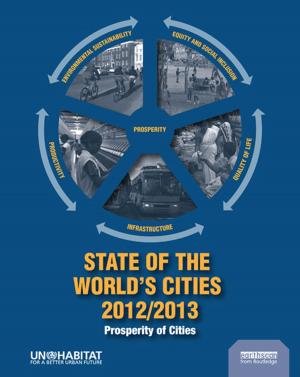Scale
Nonfiction, Science & Nature, Science, Earth Sciences, Geography, Social & Cultural Studies, Social Science, Human Geography| Author: | Andrew Herod | ISBN: | 9781134273874 |
| Publisher: | Taylor and Francis | Publication: | September 13, 2010 |
| Imprint: | Routledge | Language: | English |
| Author: | Andrew Herod |
| ISBN: | 9781134273874 |
| Publisher: | Taylor and Francis |
| Publication: | September 13, 2010 |
| Imprint: | Routledge |
| Language: | English |
Geographical scale is a central concept enabling us to make sense of the world we inhabit. Amongst other things, it allows us to declare one event or process a national one and another a global or regional one. However, geographical scales and how we think about them are profoundly contested, and the spatial resolution at which social processes take place – local, regional or global – together with how we talk about them has significant implications for understanding our world.
Scale provides a structured investigation of the debates concerning the concept of scale and how various geographical scales have been thought about within critical social theory. Specifically, the author examines how the scales of the body, the urban, the regional, the national, and the global have been conceptualized within Geography and the social sciences more broadly. The first part of the book provides a comprehensive overview of how different theoretical perspectives have regarded scale, especially debates over whether scales are real things or merely mental contrivances and/ or logical devices with which to think, as well as the consequences of thinking of them in areal versus in networked terms. The subsequent five chapters of the book then each takes a particular scale: the body; the urban; the regional; the national; the global and explores how it has been conceptualized and represented discursively for political and other purposes. A brief conclusion draws the book together by posing a number of questions about scale which emerge from the foregoing discussion.
The first single-author volume ever written on the subject of geographical scale, this book provides a unique overview in pushing understandings of scale in new and original directions. The accessible text is complimented by didactic boxes, and Scale serves as a valuable pedagogical reference for undergraduate and postgraduate audiences wishing to become familiar with such theoretical issues.
Geographical scale is a central concept enabling us to make sense of the world we inhabit. Amongst other things, it allows us to declare one event or process a national one and another a global or regional one. However, geographical scales and how we think about them are profoundly contested, and the spatial resolution at which social processes take place – local, regional or global – together with how we talk about them has significant implications for understanding our world.
Scale provides a structured investigation of the debates concerning the concept of scale and how various geographical scales have been thought about within critical social theory. Specifically, the author examines how the scales of the body, the urban, the regional, the national, and the global have been conceptualized within Geography and the social sciences more broadly. The first part of the book provides a comprehensive overview of how different theoretical perspectives have regarded scale, especially debates over whether scales are real things or merely mental contrivances and/ or logical devices with which to think, as well as the consequences of thinking of them in areal versus in networked terms. The subsequent five chapters of the book then each takes a particular scale: the body; the urban; the regional; the national; the global and explores how it has been conceptualized and represented discursively for political and other purposes. A brief conclusion draws the book together by posing a number of questions about scale which emerge from the foregoing discussion.
The first single-author volume ever written on the subject of geographical scale, this book provides a unique overview in pushing understandings of scale in new and original directions. The accessible text is complimented by didactic boxes, and Scale serves as a valuable pedagogical reference for undergraduate and postgraduate audiences wishing to become familiar with such theoretical issues.















